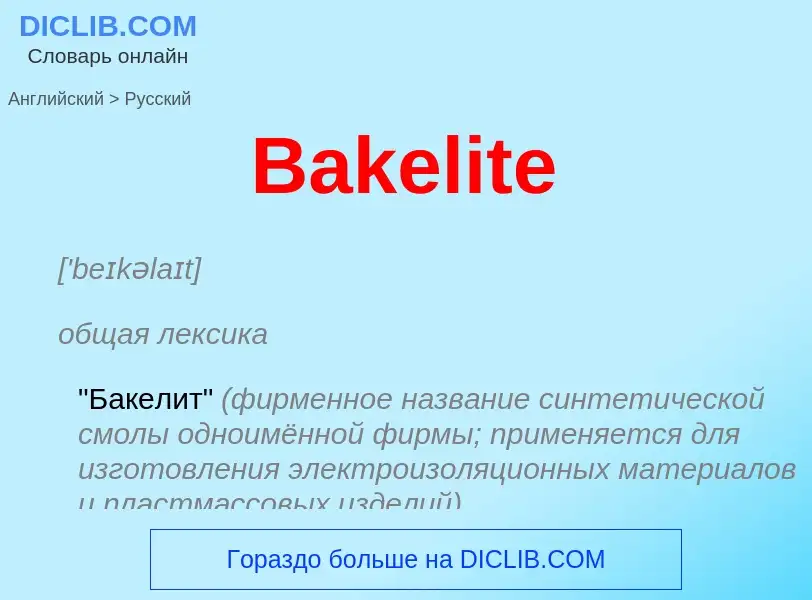Перевод и анализ слов искусственным интеллектом ChatGPT
На этой странице Вы можете получить подробный анализ слова или словосочетания, произведенный с помощью лучшей на сегодняшний день технологии искусственного интеллекта:
- как употребляется слово
- частота употребления
- используется оно чаще в устной или письменной речи
- варианты перевода слова
- примеры употребления (несколько фраз с переводом)
- этимология
Bakelite - перевод на русский
['beɪkəlaɪt]
общая лексика
"Бакелит" (фирменное название синтетической смолы одноимённой фирмы; применяется для изготовления электроизоляционных материалов и пластмассовых изделий)
по имени изобретателя Л.Бакеланда [L.H.Baekeland, 1863-1944]
['beikəlait]
строительное дело
бакелит
существительное
специальный термин
бакелит
Определение
Википедия

Bakelite ( BAY-kə-lyte), formally Polyoxybenzylmethyleneglycolanhydride, is a thermosetting phenol formaldehyde resin, formed from a condensation reaction of phenol with formaldehyde. The first plastic made from synthetic components, it was developed by Leo Baekeland in Yonkers, New York in 1907, and patented on December 7, 1909 (U.S. Patent 942699A).
Because of its electrical nonconductivity and heat-resistant properties, it became a great commercial success. It was used in electrical insulators, radio and telephone casings, and such diverse products as kitchenware, jewelry, pipe stems, children's toys, and firearms. The "retro" appeal of old Bakelite products has made them collectible.
The creation of a synthetic plastic was revolutionary for the chemical industry, which at the time made most of its income from cloth dyes and explosives. Bakelite's commercial success inspired the industry to develop other synthetic plastics. As the world's first commercial synthetic plastic, Bakelite was named a National Historic Chemical Landmark by the American Chemical Society.


![A Bakelite [[domino]] A Bakelite [[domino]]](https://commons.wikimedia.org/wiki/Special:FilePath/Bakelite Domino (5467420994).jpg?width=200)




![A combustion engine's spark [[distributor]] rotor made of Bakelite A combustion engine's spark [[distributor]] rotor made of Bakelite](https://commons.wikimedia.org/wiki/Special:FilePath/RotorBakelite-2.jpg?width=200)
